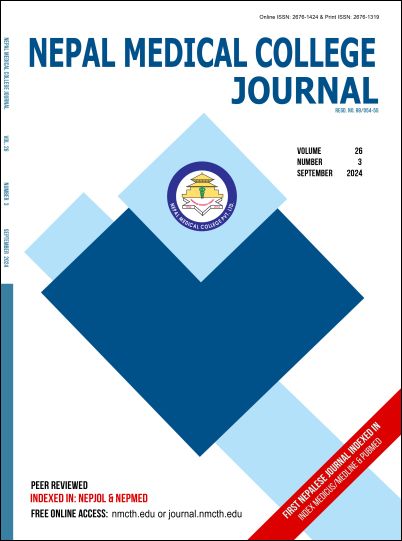Knowledge of Periconceptional Folic-Acid among Women of Childbearing age Visiting Tertiary Care Hospital in Nepal
DOI:
https://doi.org/10.3126/nmcj.v26i3.69885Keywords:
Folic acid, Periconceptional, Supplementation,, Neural Tube Defects (NTDs)Abstract
The value of periconceptional folic acid supplementation in reducing the incidence of neural tube abnormalities in newborns is widely known. Yet, Nepalese women of childbearing age are mainly ignorant of it. The current study examined different sociodemographic and health factors related to women’s level of knowledge about folic acid among women visiting Obstetrics and Gynaecology outpatients at a Tertiary Care Center in Nepal. It also evaluated the awareness and relevance of knowledge regarding folic acid and its periconceptional supplementation. 400 women aged 18 and 45 who sought Obstetrics and Gynecology Outpatient Services at the Tertiary Care Facility participated in this cross-sectional study. Sociodemographic information was gathered with the help of a self-report questionnaire and processed in IBM-SPSS software at a significance threshold of 0.05. Results of the studies showed that while 47.3% had heard of it, only 34.25% had adequate knowledge of periconceptional folic acid supplementation. Also, besides age (p=.493), knowledge of folic acid was significantly associated with factors including education(p=.026), ethnicity (p=<.001), income (p=.011), employment (p=.001), marital status (p=.007), past pregnancies (p=.031) and ANC visits (p=<.001). The study demonstrates the need for more public awareness to boost folic acid knowledge, adherence, and intake and ultimately lower the prevalence of related birth abnormalities. To quantify the hidden issue, further studies on the prevalence of NTDs in Nepalese society and the contribution of folic acid to their reduction are required.
Downloads
Downloads
Published
How to Cite
Issue
Section
License
Copyright (c) 2024 Nepal Medical College Journal

This work is licensed under a Creative Commons Attribution 4.0 International License.
This license enables reusers to distribute, remix, adapt, and build upon the material in any medium or format, so long as attribution is given to the creator. The license allows for commercial use.




